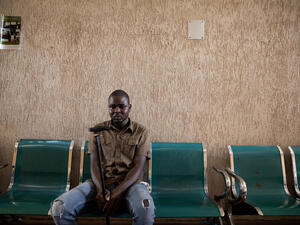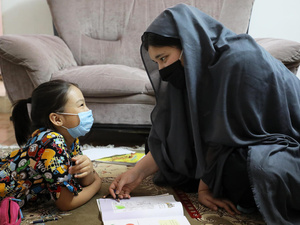Q&A: Greece's new immigration policies based on "dangerous generalizations"
Q&A: Greece's new immigration policies based on "dangerous generalizations"
ATHENS, Greece, July 10 (UNHCR) - Greece has introduced strict policies aimed at combating irregular immigration and passed legislation that could compromise the effective protection of people applying for asylum for the first time or on appeal. Charis Karanikas of the Ta Nea daily newspaper recently met Giorgios Tsarbopoulos, head of UNHCR's office in Athens, to talk about the implications of this new legislation and a police crackdown on alleged illegal immigrants. Excerpts from the interview:
What do you think of the latest measures?
The reasoning behind them is based on dangerous generalizations. We cannot speak only about "illegal" immigrants. Amongst them are many people who are in need of protection and whom the state is obligated to protect.
Should police measures be beefed up?
Yes, as regards the smugglers and the traffickers. But the problem cannot be handled only by police measures. Harsher policing at the border must be coupled with the creation of reception facilities.
What can be done in neighbourhoods inundated by immigrants?
Firstly, all those who are entitled to it under the law should be referred to special accommodation facilities. They include asylum-seekers and unaccompanied minors. Today, hundreds of people who have a right to this are homeless. In general, there is a need for shelter planning, regardless of whether people are legal or illegal.
Will the violence seen in the central Athens neighbourhood of Agios Panteleimon, home to many homeless Afghan migrants and asylum-seekers, spread to other areas?
I hope not.
How can this be avoided?
By isolating the extreme reactions, which simply serve to shift the problem. And through a dialogue between the government and the political parties, initiatives taken by the municipalities as well as talks with organizations of immigrants and refugees.
Do you agree with transforming military camps into reception centres?
Reception facilities and administrative detention centres for immigrants in view of their deportation are two separate things. It's not enough to turn some installations into detention centres if you pretend to create proper reception conditions.
Can Greece address this problem alone?
No.
What's your opinion about the European Union's stand on the matter?
It is steering clear of establishing binding mechanisms and practices for fairer responsibility sharing among the member states.
How many immigrants arrive in Greece each year?
In 2008, 146,337 people were arrested for "illegally entering and residing" in the country. There are, of course, others who have not been arrested. On the other hand, an unknown number of those who have been arrested were already residing in the country. Therefore the official data needs further analysis.
How many of them end up in existing reception centres?
All those who enter the country without papers are detained for up to three months at the administrative detention centres. Those who request asylum are transferred to open reception centres, which are too few to meet demand.
What are conditions like at these centres?
Most of the detention centres do not meet the basic conditions of human rights. The exceptions include the new centres on the island of Samos and in the Evros region [Filakio], however both are faced with problems of overcrowding.
What about reception conditions?
Reception facilities in border areas should include services and specialized staff in order to ensure the identification of people who are entitled to protection, assessment of their needs, information about their rights and obligations, and facilitation for their access to the asylum procedure.
Do you think the number of people who apply for asylum is less than the number who need it?
Those who deserve asylum are fewer than those who request it. And those who request it are not all refugees who genuinely deserve it.
Why don't those who need asylum apply for it?
It's because they don't get the right information or legal advice, especially in the border areas. It's also because they don't manage to submit their application . . . or because they don't trust Greece's very problematic asylum system.
What are the main problems with Greece's asylum system?
The initial processing and decision-making is unreliable, and the refugee recognition rate is almost zero. Not all asylum claims are registered swiftly, while many asylum-seekers lose their right to appeal. The procedure for adjudicating the claims is extremely slow.
What are the most common complaints you get from immigrants and refugees?
Delays in the adjudication of their asylum applications; lack of shelter and social care; informal push-backs or returns to Turkey across the Evros River [in north-east Greece], cases of ill-treatment.
And what do you do about them?
It depends. We address formal letters to the authorities; we try to solve the problem in an ad hoc way if possible; and we often refer individual cases to non-governmental organizations which provide legal and social support.









